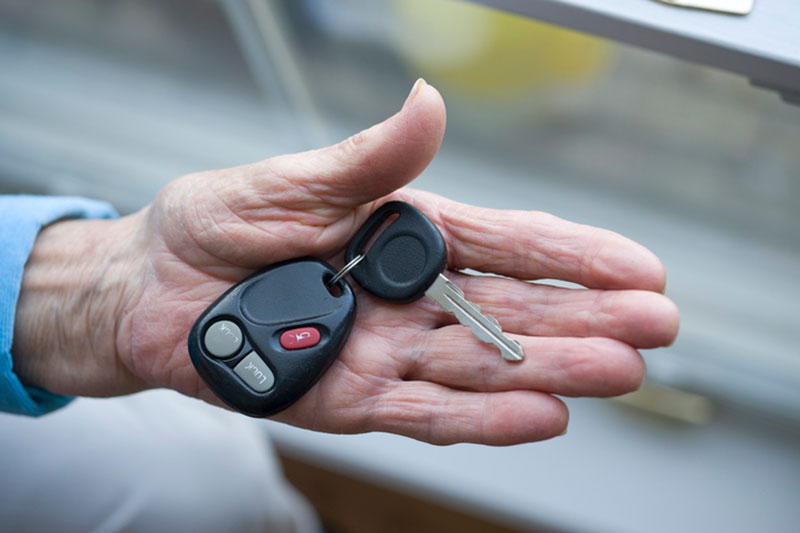
When it is time to give up the car keys, freedom and independence become major concerns for older adults.
It is a discussion none of us wants to have with our aging parents, but one that will most likely be essential at some time. Having the ability to drive whenever and wherever we choose is a key component to our feeling of freedom, yet as we grow older, driving becomes unsafe for a variety of reasons: decreased reflex and response times, cognitive problems, poor vision, and more. If you are starting to have concerns about an older loved one’s capacity to continue to drive safely, it may be time for them to give up the car keys.
How Will You Know That It is Time for an Older Adult to Stop Driving?
There are certain red flags to watch for that suggest the need for an older adult to no longer drive, including:
- Becoming lost on familiar driving routes
- Missing traffic signals or signs
- Failure to yield or cutting off other drivers
- Making wider turns than necessary
- Not staying between the lines
- Appearing to be inattentive or sleepy
- An inability to judge distances properly
- Becoming frustrated, angry, or agitated
- Not using turn signals or mirrors accordingly
How Can You Begin the Discussion About Giving Up the Keys?
Most importantly, try to avoid criticizing or correcting the person’s errors as they are driving, as this can cause further dangerous behaviors. Once the car is parked, calmly mention specific instances of concern that you witnessed as a starting point to the bigger discussion in regard to the need for the person to cease driving.
The following tips are a good way to move the conversation forward and to ensure you’ll be heard and taken seriously. Use the conversation to lower the older adult’s stress and to offer a solution to empower the individual to maintain independence.
Key Points to Keep in Mind:
- Employ help from others that the older adult knows and trusts, either in supplying their own instances of concerns or even in joining you for the conversation.
- Steer clear of shaming or blaming the person.
- Keep your temperament calm and encouraging so that you do not seem angry.
- Use specific examples of worrying habits.
- Let the individual know you are in this together, and that collectively you are going to find a solution that ensures safety for the older adult as well as other drivers and pedestrians.
- Expect to see opposition and defensiveness, and that it could take more than one conversation.
If the person remains insistent about continuing to drive, schedule a checkup and assessment with the doctor. There may be side effects from medications, vision problems, or other health-related reasons for driving difficulties that can be fixed; or the doctor may have more influence in encouraging the older adult to stop driving.
How Does Home Care Help When It is Time to Give Up the Car Keys?
Fortunately, there is a simple answer that allows an older adult to get around as they wish: a professional in-home care provider from Compassionate Nursing Services, a trusted provider of home and memory care in Clayton, MO and the surrounding areas.
Our care providers are available to offer transportation and accompaniment whenever and wherever the older adult wants to go, including:
- Medical appointments and procedures
- Shopping and running errands
- Social visits
- Going out to lunch or for a walk in the park
- Hair and nail appointments
- Exercise or other classes
- Even vacations or longer-distance outings
- The best part? A caregiver offers friendly companionship and conversations that make any excursion much more enjoyable than going alone!
Reach out to our experts in home care and memory care in Clayton, MO and the surrounding communities at 314-432-4312 to ask about our transportation services for older adults that will help maintain independence and safety.
